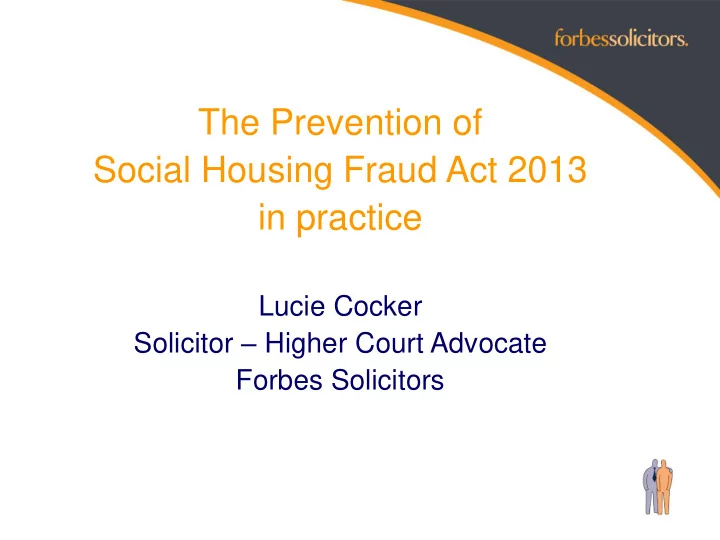

The Prevention of Social Housing Fraud Act 2013 in practice Lucie Cocker Solicitor – Higher Court Advocate Forbes Solicitors
Introduction The Prevention of Social Housing Fraud Act 2013 (‘the Act’) • Addresses tenancy fraud arising out of unlawful subletting • Does not deal with any other form of tenancy fraud • What we will cover…
What is the Act trying to achieve? • Ensure social housing is occupied by those in greatest need • Ensure tenants do not profit from their social housing tenancy • Introduces changes to both civil and criminal law
Unlawful Profit Orders • May require a Defendant to pay the landlord the profit that they have made from unlawful sub- letting • Different provisions for UPOs within civil and criminal proceedings
Civil Unlawful Profit Order (1) • Can apply for a Civil UPO where you have a secure or assured tenant who: • in breach of their tenancy agreement, • ceases to occupy their home, • sub-lets or parts with possession of it (or part of it), and • receives money in return.
Civil Unlawful Profit Order (2) • Will not apply to assured shared ownership leases • Maximum payable = net profit made • Court has discretion to decide the amount payable • A useful tactical device
Criminal Unlawful Profit Order • Courts are obliged to consider following conviction • Can be made in addition or instead of other sanctions • Preference given to UPO • Maximum payable = net profit made
Factors equally applicable to Civil and Criminal UPO’s • Court must consider Defendant’s means when setting payments • Can make a civil and criminal UPO – subject to maximum • Landlord needs permission from the court to enforce • If Defendant fails to pay, the amount payable will attract interest at the Judgment Act rate
The Act and Security of Tenure • Significant change to assured tenant’s security of tenure • Assured tenants can no longer defeat a NTQ • Security of tenure once lost will be lost forever • Ensures assured tenants are in exactly the same position as secure tenants
Criminal offences created by the Act • LA’s given power to prosecute tenants who unlawfully sub-let • Creates two new criminal offences • Offences for secure tenants – Section 1 of the Act • Offences for assured tenants – Section 2 of the Act
The Less Serious Offence (1) • Committed if the tenant: • ceases to occupy the property as his only or principal home, • either sub-lets or parts with possession of it (or part of it without the landlord’s consent) and • knows this is in breach of his tenancy agreement.
The Less Serious Offence (2) • 2 Exceptions: • Violence or threats of violence • Right to occupy • Time-limits: • 6 month limit • 3 year limit Maximum Sentence: £5000 fine
The More Serious Offence (1) • The tenant not only knows he is breaching his tenancy agreement but he does so dishonestly • Dishonesty amounts to: “knowledge that a reasonable and honest person would consider the action in question to be dishonest” R v Ghosh [1982] • Ultimately a question of fact – will eventually be clarified by case law
The More Serious Offence (2) • No exceptions • On Summary conviction - 6 months in prison, a fine not exceeding £5000 or both • On Indictment - up to 2 years in prison, a fine or both
What to do at the outset… Using new powers to prosecute • LA’s can prosecute for main and associated offences – e.g. aiding, abetting etc • Can prosecute whether or not landlord and on behalf of other LA’s • Government to provide an additional £9.5 million to spend specifically on combating housing fraud • Anticipated that prosecutions will only be used in the more serious cases of sub-letting • Formal agreements between LA’s and HA’s advisable
Regulations and information sharing • Important to link tenant to another address • Information sharing with banks, building societies and utility companies • Regulations to be introduced, to include: • Who can use the power • Which organisations • Additional safeguards • Creation of an offence for non-compliance
How are organisations tackling tenancy fraud using the Act?
Southwark Council • Poster – advising illegal subletting is now a criminal offence • Fraud hotline • Use of website • Dedicated Anti Fraud Team
Nottingham City Homes & Newham Council • Implemented a key amnesty – tenants were given the opportunity to return keys by designated date in order to avoid prosecution • Tenants warned they would be prosecuted if keys were not returned in accordance with the amnesty
Gloucester City Homes • Implemented full tenancy fraud policy • Want to encourage residents to report suspicions • Will take appropriate action against perpetrators • Will recover unlawful profit where appropriate • Will work with other agencies
How do I tackle tenancy fraud? Use your Match your Visit your data data properties Employ Publicise Link with dedicated your efforts agencies fraud officers and results (LA) Take Arrange a Key Have a policy enforcement amnesty action
Conclusion • We await case law to show how the new law will be implemented in the criminal and civil courts • In the meantime – need to prepare and adapt accordingly • Develop links with LA
If In Doubt... Call Forbes Solicitors for free initial advice: • Lucie Cocker 01772 220 244 / 07976 268 268 lucie.cocker@forbessolicitors.co.uk Your Attention Is Directed To This Note These materials are supplied as general illustrations of legal issues and not as legal advice applicable to any particular person or situation. These materials may not be relied upon as legal advice. Forbes shall not be liable for any loss caused to any person through any action or omission made in reliance on these materials or any connected presentation. Forbes Solicitors 2014
Recommend
More recommend